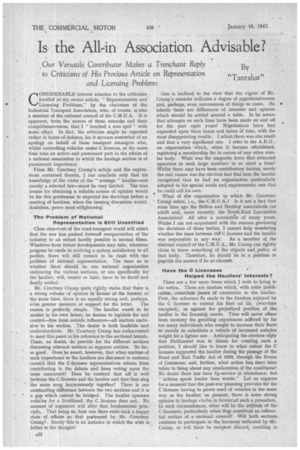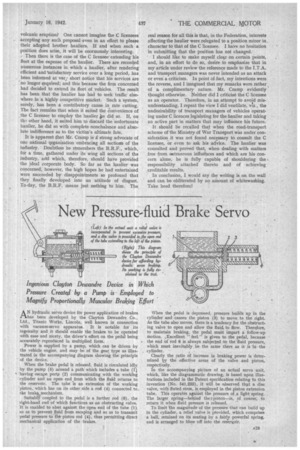Is the All-in Association Advisable?
Page 24

Page 25

If you've noticed an error in this article please click here to report it so we can fix it.
Our Versatile Contributor Makes a Trenchant Reply to Criticisms of His Previous Article on Representation and Licensing Problems By
"Tantalus))
ONSIDERABLE interest attaches to the criticisms levelled at my recent article, " Representation and • Licensing Problems," by the chairman of the Industrial Transport Association, who, of course, is also a member of the national council of the C.M.U.A. It is apparent, from the nature of these remarks and their compiehensiveness, that I "touched a sore spot" with some effect. In fact, the criticism might be regarded • rather in terms of defence, for it savours somewhat of an apology on behalf of those transport managers who, whilst controlling vehicles under C licences, at the same time take an active and prominent part in the affairs of a national association in which the haulage section is of paramount importance.
From Mr. Courtney Cramp's article and the expressions contained therein, I can conclude only that his knowledge of the views of the " average " haulier—not merely a selected few—must be very limited. The true means for obtaining a reliable census of opinion would be for this gentleman to expound his doctrines before a meeting of hauliers, when the ensuing discussion would, doubtless, prove most enlightening. '
The Problem of National • Representation is Still Unsettled
Close observers of the road-transport world will admit that the war has pushed forward reorganization of 'the industry to an extent hardly possible in normal times. Whatever form future developments may take, whatever progress be made in evolving a system satisfactory to all parties, there will still remain to be dealt with -the problem of national representation. The issue as to whether there should be one national organization embracing the various sections, or one specifically for the haulier, will, sogner or later, have to be faced-and finally settled.
Mr. Courtney Cramp quite rightly states that there is a strong volume of opinion in favour of the former; at the same time, there is an equally -strong and, perhaps, even greater measure of support for the latter. The reason • is perfectly simple. The haulier want§ to be master in his own house; he desires to legislate for and control—free from outside influences—all matters exclusive to his section. , The desire is both laudable and understandable. Mr. Courtney Cramp has endeavoured to meet this point in. his reference to the sectional boards. These, no doubt, do provide for the different sections discussing relevant matters as separate entities. So far, so good. Does he assert, however, that when matters of such importance to the hauliers are discussed in national council that the C-licensee representatives refrain from contributing to the debate and from voting upon the issue concerned? Does he contend that all' is well between the C licensee and the haulier and that they sing the same song harmoniously together? There is one outstanding difference between the two sections and it is • a gap which cannot be bridged. The haulier operates vehicles for a livelihood; the C licensee does not. No amount of argument will alter that fundamental principle. that being so, how can there exist Such a happy state of affairs as that portrayed by Mr. Courtney Cramp?. Surely this is an instance in which the wish is father to the thought? One is inclined to the view that the vigour of Mr. Cramp's remarks indicates a degree of apprehensiveness and, perhaps, even nervousness of things to come. He • admits there are differences of interests and opinion which should be settled around a table. Is he aware that attempts on such lines have been Made on and oil for the past eight years? Negotiations have had expended upon them hours and hours of time, with the most disappointing results. I admit there was one result and that a very significant one. I refer to the A.R.O.. an organization which, when it became ettablished, regiiterect a membership far in excess of any other similar body. What was the magnetic force that attracted operators in such large numbers in so short a time? Whilst there may have been contributory factors, surely the real reason was the obvious fact that here the haulier recognized that he had an organization particularly adapted to his special needs and requirements; one that he could call his own. •
What of the organization to whic• h Mr. Courtney
Cramp refers, i.e., the C.M.U.A.? Is it not a fact that some time ago the Beaton and Burrilek associatiorfs cut adrift and, more recently, the South-East Lancashire Association? All after a connectiL of many years. Whilst I am not acquainted with the reasons governing the decisions of these bodies, I cannot help wondering whether the issue between thg C licensee and the haulier was responOble in any way. As a member ot the national council of the C.M.U.A., Mr. Cramp can rightly claim to know something of the objects and policy of that body. Therefore, he Should be in a position to provide the answer if he so choosa.
Have the C Licensees Helped the Hauliers' Interests?
There are a few more items which I wish to bring to his notice. These are matte's which, with some justification, constitute bones of contention to the haulier. First, the reference lie made to the freedom enjoyed by the C licensee to extend his fleet ad lib. (war-time excepted), as against the prejudiced position of the haulier in the licensink courts. Time will never efface from memory the gruelling experiences suffered by far too many individuals who sought to increase their fleets or merely .to substitute a vehicle of increased unladen weight for a lighter one. Anticipating the obvious reply that Parliament was to blame for creating such a position, I should like to know to what extent the C licensee supported the haulier during the passage of the Road and Rail Traffic Act of 1933, through the House of Commons; and, further, what action has since been taken to bring about any amelioration of the conditions? No doubt there has been lip-service hi abundance; but " actions speak louder than words." Let us suppose for a moment that the post-war planning provides for the C licensee having to prove need of vehicles in the same way as the haulier; en passant, there is some strong opinion in haulage circles in favour,of such a procedure. In such circumstances, what will be the attitude of the C licensees, particularly when they constitute an influential section of a •national council? Will both sections continue to participate in the harmony indicated by Mr. Cramp, or will there be rampant discord, resulting in volcanic eruption? One cannot imagine the C licensees accepting any such proposal even in an effort to please their adopted brother hauliers. If and when such a position does arise, it will be enormously interesting.
• Then there is the case of the C licensee extending his Beet at the expense of the haulier. There are recorded numerous instances in which a haulier, after rendering efficient and 'satisfactory service over a long period, has been informed at very short notice that his services are no longer required; and this because the firm concerned had decided to extend its fleet of vehicles. The result has been that the haulier has had to seek traffic elsewhere in a highly competitive market. Such a system, surely, has been a contributory cause in rate cutting. The fact remains that when it suited the Convenience of :the C licensee to employ the haulier ke did so. If, on ttel other hand, it suited him to discard the unfortunate haulier, he did so with complete nonchalance and absolute indifference as to the victim's ultimate fate.
It is apparent That Mr. Cramp is a' strong advocate of one national qrganization embracing all sections of the industry. Doubtless he remembers the B.R.F., which, for a time, gathered under its wing all sections of the industry, arid which, therefore, should have provided the ideal corporate body. So far as the haulier was concerned, however, the high hopes he had entertained were succeeded by disappointments so profound that they finally developed into an attitude of disgust. To-day, the B.R.F. means just nothing to him. The real reason for all this is that, in the Federation, interests affecting the haulier were relegated to a position minor in, character to that of the C licensee. I have no hesitation in submitting that the position has not changed.
• I should like to make myself clear on ;certain points, and, in an effort to do so, desire to emphasize that in my article under review the reference made to the I.T.A. and transport managers was never intendedas an attack or even a criticism. In point of fact, my intentions were the reverse, and I imagined that my remarks were rather of a complimentary nature. Mr. Cramp evidently thought otherwise. Neither did I criticize the C licensee as an operator. Therefore, in an attempt to avoid misunderstanding, I repeat the view I did ventilate, viz., the undesirability of transport managers of vehicles operating under C licences legislating for the haulier and taking an active part in matters that may influence his future. It should be recalled thal when the road-transport scheme orthe Ministry of War Transport was under consideration it was not found necessary to consult the C licensee, or even to ask his advice. The haulier was consulted and proved that, when dealing with matters free from eatraneous influences and which are his con. ceni alone, he is fully capable of shouldering the. responsibility attached thereto and of achieving creditable results.
In conclusion, I would say the writing is on the wall and can be obliterated by no amount of whitewashing. Take heed therefore!




















































